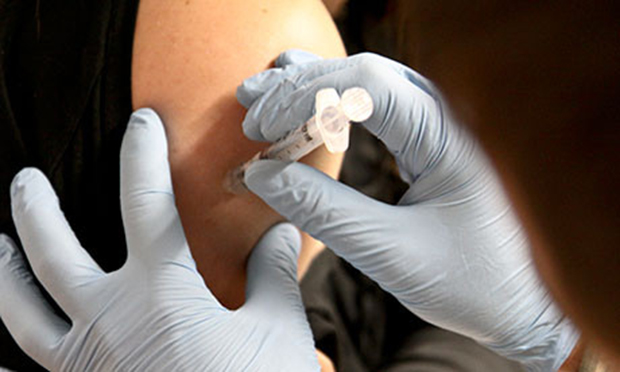Council bosses brand consultation on mandatory jabs ‘unhelpful’

Photograph: Flickr.
Islington Council’s chief executive has criticised a government consultation on mandatory vaccinations for social care staff as “not particularly helpful”.
Top officer Linzi Roberts-Egan was speaking in a regular briefing to councillors on the pandemic, with community safety and coronavirus response lead Cllr Sue Lukes calling for a “very strong response” to the government consultation.
Councillor and officer united in saying that the approach Islington Council prefers is one of “encouraging” staff to take the jab rather than “forcing” them to do so.
Roberts-Egan revealed that borough bosses had been “particularly concerned” after Christmas with low rates of take-up among adult social care staff, though more recent figures showed an “incremental rise”.
She said: “There is still consultation at the moment out from government to seek views as to whether it should be mandatory for those staff who work in social care to have a vaccination. I wouldn’t offer a political view on [the consultation].
“As a professional, I don’t think that is particularly helpful. I think it is much more incumbent on us to encourage, offer advice support and education rather than to categorically say, ‘In order to do this job, you must do the following’.
“The reason I would say that is that evidence we have to date is people coming on board when it is a collaborative conversation rather than an order. Secondly, it is incredibly hard to attract staff into adult social care, and we don’t need anything that is actually going to cause that to be made even more fragile.”
Lukes added: “It’s not just that it goes against so many other principles, that it potentially disadvantages so many people who already suffer so much disadvantage, there’s also no real public health argument for it.
“We do know that the vaccination does not actually stop people necessarily getting infected, and it is possible that vaccinated people will pass on infection.”
According to the most recent NHS data, 45.5 per cent of Islington’s older adult care homes could report that at least 80 per cent of total staff have been vaccinated with at least one dose.
The government recently announced it is considering amending social care regulations so that older adult care home providers would only be able to use staff who had got the jab or were legitimately medical exempt, with a 21 May deadline for responses to the consultation.
Experts sitting on the social care working group of the Scientific Advisory Group for Emergencies (SAGE) have advised that 80 per cent of staff and 90 per cent of residents need vaccinating for a minimum level of protection against Covid outbreaks, with only 53 per cent of English older adult homes currently meeting this threshold.
The staff vaccination rate is below 80 per cent in all 32 London boroughs currently, with 27 local authority areas in England below 70 per cent.
Introducing the consultation, health secretary Matt Hancock said: “Older people living in care homes are most at risk of suffering serious consequences of Covid-19 and we have seen the grave effects the virus has had on this group.
“Making vaccines a condition of deployment is something many care homes have called for, to help them provide greater protection for staff and residents in older people’s care homes and so save lives.”
The council is understood to be avoiding the phrase ‘vaccine hesitancy’ in encouraging staff to receive the injection.
Roberts-Egan said: “People don’t see themselves as hesitant, they see themselves as curious. They want to understand more, and have a right to understand more, so that language could be perceived as somewhat derogatory, punitive, and pointing them out as being different when in fact they have taken a different approach.”
Quizzed by Green Cllr Caroline Russell on the borough’s preparedness for surge testing if it became necessary, Roberts-Egan replied that she was “confident” Islington was ready.
She said local officials had learnt from other boroughs that the correct approach was to focus on chains of transmission rather than a blanket search across an area.
Islington’s transmission rate of the virus across all ages, according to the most recent statistics, is 17.3 per 100,000 people, against a national average of 25.8.
